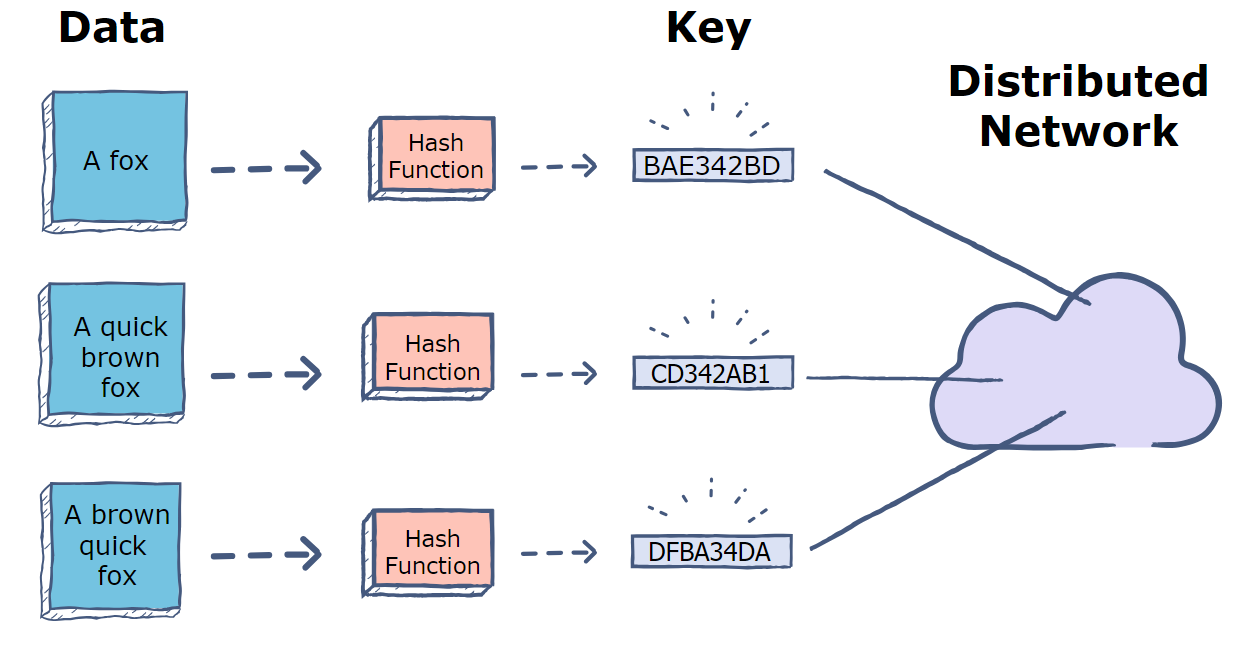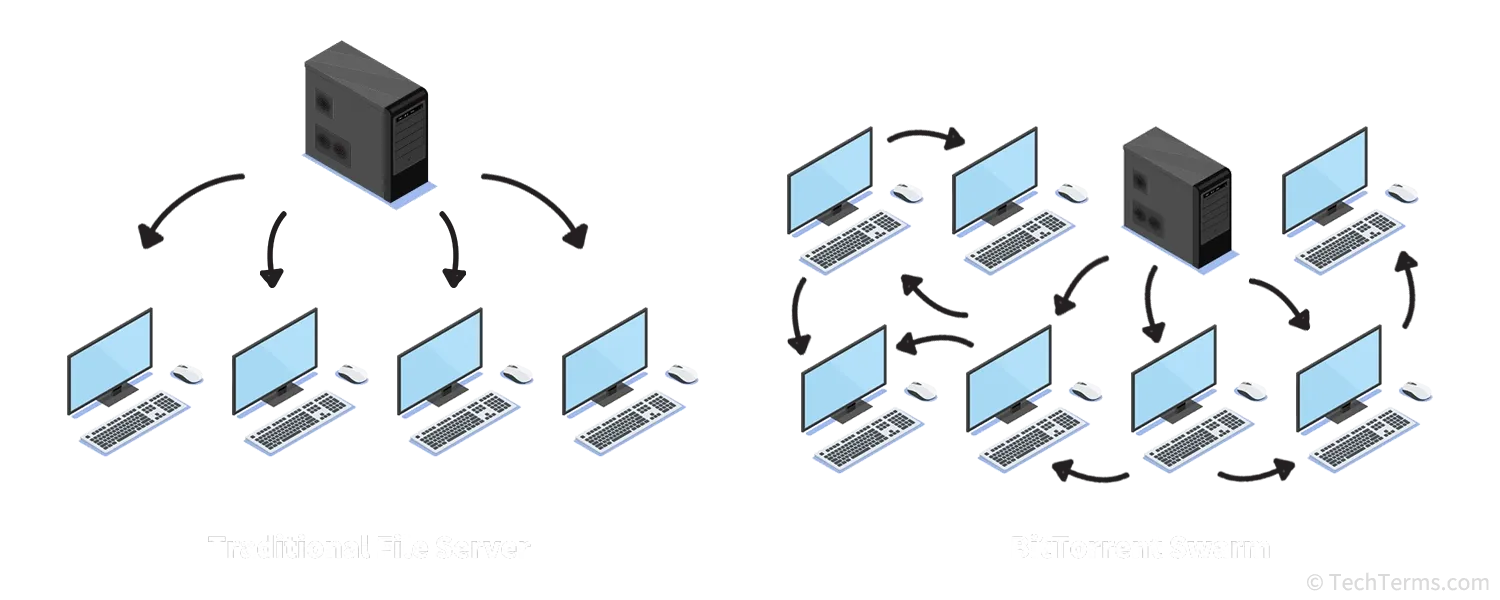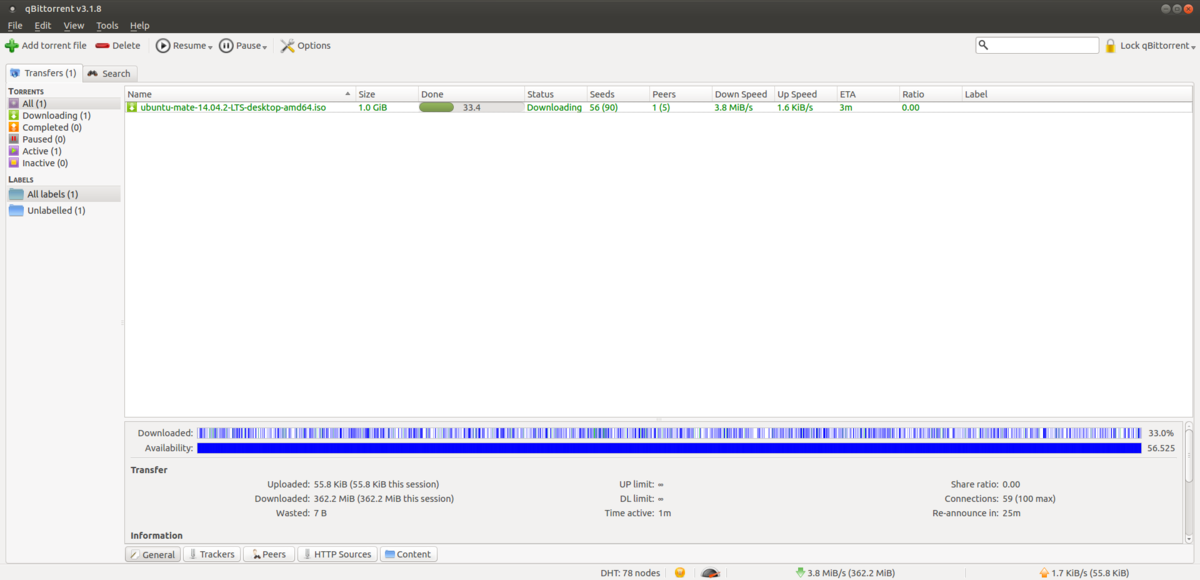Sentinel team member ProjectAutonomy revealed an interesting future development possibility in a status update to the community earlier this month: Once further efforts have been made to bolster Sentinel's dVPN architecture, the core team will explore creating an on-chain torrent system.
Non-dVPN uses for the Sentinel blockchain have been formulated by the team and community for years. Aside from torrents, such theoretical usecases include data scraping for AI developers; and applications like chat and email clients.
All of these interesting ideas have taken a backseat to the development of the core dVPN architecture of the chain, but provide great insight into grand future ambitions of the project.
How Does VPN Relate to This?
Centralized VPNs (cVPNs) use a masternode to facilitate the process of identifying a node or server to connect a user to. Similarly, a torrent tracker is a server that allows peers to connect to seeds within the BitTorrent file-sharing network using the Distributed Hash Table (DHT) peer discovery system. Both are core components of their respective technologies.

One of the foremost innovations of dVPN over traditional VPNs is the ability of the Sentinel blockchain to find users nodes without the use of a centralized mechanism. The danger that centralization poses to user safety and security has long been the chief complaint of dVPN proponents against the traditional architecture of VPNs.
Arguments for why features like these are needed for dVPN generally revolve around decentralization; when it comes to torrents, the basis for why Sentinel is needed is quite different.

BitTorrent's Weaknesses
The Issue of Incentivization
Unlike its counterpart in cVPNs, the DHT peer discover system is already recognized by the digital privacy community as sufficiently decentralized—and is often admired as quasi-ancestor of blockchain.
Rather, the Sentinel team's critique of BitTorrent stems from the premise that DHT's Web 2.0 origins have precluded it from having a built-in economy to incentivize users, instead of concerns about privacy or security.

DHT was introduced to BitTorrent in 2005, over three years before Bitcoin's whitepaper was published. Bitcoin brought with it blockchain, and blockchain has brought with it Web3—and a burgeoning societal expectation that contributors to decentralized networks should be compensated monetarily for their work and resources.
Because of innovations made in the past decade by Web3, digital institutions that survive on pure volunteerism can no longer credibly make the claim that rewarding contributions is outside of their ability. Young, digitally native internet users have grown weary of these business models, or in some rarer cases have adopted an outright hostile disposition towards them.
As anybody familiar with torrents and piracy knows, there is technically no real reason why anybody needs to seed a torrent after they download it. In fact, the only thing keeping the entire BitTorrent network running is people donating their hardware and bandwidth resources to the cause out of a sheer sense of duty or altruism (aside from the occasional private tracker member who has to maintain a decent seed/leech ratio in order to maintain their access, of course).
The Issue of Sustainability

It is undeniably a beautiful thing that pre-Web3 projects like BitTorrent have survived for decades on nothing but the dedication and passion of humanity. They are monuments to selflessness and sharing that deserve our collective admiration.
It would be understandable to feel like the core spirit of their communities would be altered forever by adopting a model where contributions are financially incentivized.
But Web3 has also brought with it a more long-term perspective on the digital world which was far less common twenty years ago, when there was no such thing as a perpetually self-sustaining decentralized digital economy. The concept of digital permanence simply did not exist in the way that it does today, and therefore people were content with what worked now; rather than considering whether it would still work centuries in the future.
As it stands, every current torrent tracker is an inherently temporary and fleeting service with a finite lifespan that will eventually end; either by way of being shut down by an enforcement agency, an absence of a staff to maintain it, or a loss of user interest. Digital protocols that are as reliant on human upkeep as BitTorrent, particularly ones that are persistent targets for enforcement and meddling, are no longer thought of as dependable long-term solutions.
This new paradigm has been acknowledged by the BitTorrent Foundation itself on numerous occasions, and it was also the motivation for creating and launching the BitTorrent Token in 2019.
The BTT Question
One thought that might have jumped into some of your minds when you saw this article might be: "Isn't there already an official native BitTorrent token?"
The BitTorrent Token (BTT) was indeed created in 2019 on the TRON blockchain by the BitTorrent Foundation itself. That token is used to incentivise torrent seeders and provide leechers with means to pay for faster downloads. However, describing it as a "native" asset is slightly misleading, as its presence within BitTorrent is limited to an extraneous layer on top of the traditional protocol.

That extraneous layer is only accessible via specific dApps which serve as optional extensions inside of torrent client software like µTorrent, as shown above. This has isolated the token from most everyday users of the protocol and rendered it more of a proof-of-concept for what torrenting could potentially be, rather than an impactful step towards a tangible Web3 future.
The way that Sentinel wants to approach this would be far more impactful to the everyday user of the core protocol.

Sentinel's Solution
A Perpetual Tracker
Rather than simply reveal the existence of the torrent tracker concept or announce the team's interest in exploring it, ProjectAutonomy shared extensive in-depth details about the theoretical Sentinel torrent tracker in his update—suggesting that the nascent concept is actually well-developed and has received a moderate measure of attention from the team already.
Sentinel's proposed torrent tracker concept would substitute DHT with Sentinel's blockchain-based peer discovery system. Because of the permanency of blockchain, the Sentinel team believes that this would in effect create a "perpetual torrent tracker" that is incentivized, more efficient, and cannot be blocked or stopped like traditional centralized trackers.
"Sentinel is the only DePIN project or Web3 project that has executed [the peer discovery] process on-chain at scale; this is why Sentinel is in top #10 Cosmos transactions," ProjectAutonomy said.
The portion of ProjectAutonomy's quote referring to transactions refers to the unusually strenuous workload that decentralized VPN inherently places on the blockchain. The amount of transactions on Sentinel per day often exceeds those of projects with far larger market capitalization. That established resilience in the face of routine stress testing appears to have fueled the Sentinel team's optimism about the logistics of introducing additional non-dVPN services to the chain.
Sentinel already has a network of dVPN nodes hosted by its community, and an economic structure that allows them to earn revenue for the commodity they are providing to their customers: bandwidth. At present, Sentinel Nodes can only sell it to customers for dVPN purposes; but the broader vision of Sentinel as a project has always been creating a decentralized global marketplace for bandwidth.
In effect, Sentinel's plan could provide an option for seeders to earn an automated passive income for their efforts in a trustless manner for the first time in BitTorrent's twenty-three year history.
A marketplace where digital infrastructure and resources can be traded as though they were "IRL" physical commodities (like agricultural products, energy sources, or metals) is a key characteristic of a Decentralized Physical Infrastructure Network (DePIN).
Other DePINs that Sentinel enthusiasts may be aware of include Cosmos Ecosystem cousins Akash Network (cloud computing and GPU) and Jackal Protocol (cloud storage).
To learn more about DePINs, check out this informative article from earlier this month by fellow dVPN.news contributor Jonnie Smith.
Timeframe
As mentioned before, the proposed torrent architecture is a distant prospect right now.
The Sentinel team's focus is perfection of the chain's core mechanics, releasing node hardware, and promotion of frontend applications before they expand to other non-dVPN realms—with the minor exception of AI data scraping, a feature which is already being developed as part of their efforts to bring Sentinel Nodes to Android.
Unconventional uses for the Sentinel blockchain may not be a high priority for development, but the team has shown great interest in them and has routinely brainstormed ideas with the community. After all, this project stands for much more than revolutionizing the VPN industry.

Share Your Ideas
At dVPN News and Sentinel Independent News, we have the same attitude! If you have an idea for an unconventional usecase for Sentinel, don't hesitate to share it with us through the following channels:
- The Sentinel Telegram group.
- The Sentinel Discord server.
- Alternatively, you can tag either @dVPNDAO or @Sentinel_SIN with your idea on X/Twitter.
Sentinel is a very community-focused project which thrives on the craftiness of individuals just like you! We look forward to seeing your ideas.
Join Our Journey
At dVPN.news, every member of the Sentinel community is a contributor. Whether you're writing articles, sharing tutorials, or participating in discussions, your involvement is what drives our collective growth, and best of all it's rewarded! Together, so if you to contribute to the growth of the Sentinel Network, you are in the right place!
Connect with Us
Stay in touch and be part of our growing community:
- Follow Sentinel on X (Twitter)
- Follow The Growth DAO on X (Twitter)
- Join The Growth DAO community Telegram Group.
- Join the official Sentinel Subreddit, r/dVPN.
Follow Sentinel Independent News
- S.I.N. on Telegram
- S.I.N. on X (Twitter)


